Isolationism is a political philosophy advocating a national foreign policy that opposes involvement in the political affairs, and especially the wars, of other countries. Thus, isolationism fundamentally advocates neutrality and opposes entanglement in military alliances and mutual defense pacts. In its purest form, isolationism opposes all commitments to foreign countries including treaties and trade agreements. This distinguishes isolationism from non-interventionism, which also advocates military neutrality but does not necessarily oppose international commitments and treaties in general.
Neoconservatism is a political movement that was born in the United States during the 1960s among liberal hawks who became disenchanted with the increasingly pacifist foreign policy of the Democratic Party and with the growing New Left and counterculture of the 1960s, particularly the Vietnam protests. Some also began to question their liberal beliefs regarding domestic policies such as the Great Society. Neoconservatives typically advocate the promotion of democracy and interventionism in international affairs, including peace through strength, and are known for espousing disdain for communism and political radicalism.

A state's foreign policy or external policy is its objectives and activities in relation to its interactions with other states, unions, and other political entities, whether bilaterally or through multilateral platforms. The Encyclopedia Britannica notes that a government's foreign policy may be influenced by "domestic considerations, the policies or behaviour of other states, or plans to advance specific geopolitical designs."
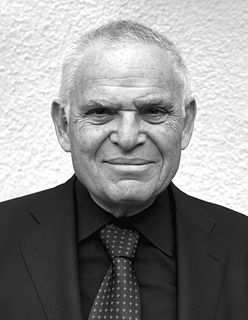
Edward Nicolae Luttwak is an American military strategist and author known for his works on grand strategy, geoeconomics, military history, and international relations. He is best known for being the author of Coup d'État: A Practical Handbook. His book Strategy: The Logic of War and Peace, also published in Chinese, Russian and nine other languages, is widely used at war colleges around the world.
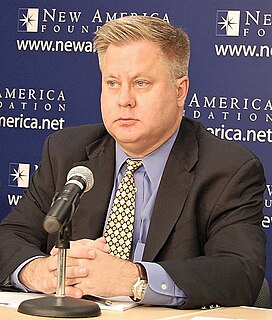
Michael Lind is an American writer and academic. He has explained and defended the tradition of American democratic nationalism in a number of books, beginning with The Next American Nation (1995). He is currently a professor at the Lyndon B. Johnson School of Public Affairs at the University of Texas at Austin.
Daniel Horace Deudney is an American political scientist and Associate Professor of Political Science at Johns Hopkins University. His published work is mainly in the fields of international relations and political theory, with an emphasis on geopolitics and republicanism.

The Elliott School of International Affairs is the professional school of international relations, foreign policy, and international development of the George Washington University, in Washington, D.C. It is highly ranked in international affairs and is the largest school of international relations in the United States.
Liberal internationalism is a foreign policy doctrine that argues two main points: first, that international organizations should achieve multilateral agreements between states that uphold rules-based norms and promote liberal democracy, and, second, that liberal international organizations can intervene in other states in order to pursue liberal objectives. The latter can include humanitarian aid and military intervention. This view is contrasted to isolationist, realist, or non-interventionist foreign policy doctrines; these critics characterize it as liberal interventionism.

Vali Reza Nasr is an Iranian-American academic and author, specializing in the Middle East and the Islamic world. He is Majid Khaddouri Professor of International Affairs and Middle East Studies at the Johns Hopkins School of Advanced International Studies (SAIS) in Washington, D.C. He served as the eighth dean of the school from 2012 to 2019. Nasr is also a Non-Resident Fellow in South Asia at Atlantic Council and is described by The Economist as "a leading world authority on Shia Islam".

Canada–Latin America relations are relations between Canada and the countries of Latin America. This includes the bilateral ties between Canada and the individual Latin American states, plurilateral ties between Canada and any group of those states, or multilateral relations through groups like the Organization of American States (OAS).
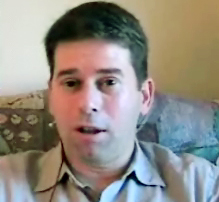
Daniel W. Drezner is an American political scientist. He is professor of international politics at The Fletcher School of Law and Diplomacy at Tufts University. He is known for his scholarship and commentary on International Relations and International Political Economy.
The League of Nations Union (LNU) was an organization formed in October 1918 in Great Britain to promote international justice, collective security and a permanent peace between nations based upon the ideals of the League of Nations. The League of Nations was established by the Great Powers as part of the Paris Peace Treaties, the international settlement that followed the First World War. The creation of a general association of nations was the final one of President Woodrow Wilson's Fourteen Points. The LNU became the largest and most influential organisation in the British peace movement. By the mid-1920s, it had over a quarter of a million registered subscribers and its membership eventually peaked at around 407,775 in 1931. By the 1940s, after the disappointments of the international crises of the 1930s and the descent into World War II, membership fell to about 100,000.

Taras Kuzio is a British academic and expert in Ukrainian political, economic and security affairs. He has British citizenship, but is based in Toronto, Canada.
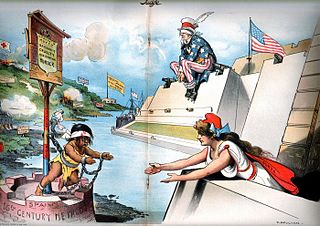
The Empire of Liberty is a theme developed first by Thomas Jefferson to identify the responsibility of the United States to spread freedom across the world. Jefferson saw the mission of the U.S. in terms of setting an example, expansion into western North America, and by intervention abroad. Major exponents of the theme have been James Monroe, Andrew Jackson and James K. Polk, Abraham Lincoln, Theodore Roosevelt, Woodrow Wilson, Franklin D. Roosevelt, Harry Truman, Ronald Reagan, Bill Clinton, and George W. Bush.
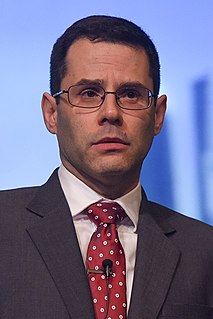
Michael Robert Auslin is an American writer, policy analyst, historian, and scholar of Asia. He is currently the Payson J. Treat Distinguished Research Fellow in Contemporary Asia at the Hoover Institution, Stanford University, a Senior Fellow in the Asia and National Security Programs at the Foreign Policy Research Institute, and a senior fellow at London's Policy Exchange. He was formerly an associate professor at Yale University and a resident scholar and director of Japanese studies at the American Enterprise Institute, a conservative think tank in Washington, D.C.

David C. Unger is a journalist, former foreign affairs editorial writer for The New York Times (1977–2013) and author of the book The Emergency State. He is currently an Adjunct Professor of American Foreign Policy at Johns Hopkins University, School of Advanced International Studies Europe, at Bologna and Contributing Editor at Survival.

David Shambaugh is the Gaston Sigur Professor of Asian Studies, Political Science & International Affairs, and director of the China Policy Program at the Elliott School of International Affairs, George Washington University, Washington DC. He is also a non-resident senior fellow at the Brookings Institution.
Kent E. Calder is the Interim Dean of the Johns Hopkins School of Advanced International Studies (SAIS). He serves as the Director of the Edwin O. Reischauer Center for East Asian Studies, and is also the Edwin O. Reischauer Professor of East Asian Studies at SAIS. He previously served as the Vice Dean for Faculty Affairs and International Research Cooperation at the Paul H. Nitze School of Advanced International Studies (SAIS), Johns Hopkins University.
Deepa M. Ollapally is research professor of international affairs and the associate director of the Sigur Center for Asian Studies at the Elliott School of International Affairs, George Washington University. She is also the director of the Rising Powers Initiative launched by the Elliott School in 2009.
This bibliography of Woodrow Wilson is a list of published works about Woodrow Wilson, the 28th president of the United States. For a more comprehensive listing see Peter H. Buckingham, Woodrow Wilson: A bibliography of his times and presidency.












